|
'CP' NEXT WEEK |
|
OF THE WAR |

|
|
| First Convoy Over Tengchung Cut-Off Arrives In Kunming |
KUNMING, CHINA - First convoy over the Tengchung cutoff on the Burma Road, a shortline emergency route, arrived here from Assam last week, under command of Capt. Richard C. Gales, Rochester, N.Y.
The short route from Myitkyina on Ledo Road to Lungling on the Burma Road cuts more than 100 miles from
|
First test trucks completed a trip over the route on January 22, and Capt. Gales reports much progress has been made since that date by the 10,000 Chinese working on the road and the Burma Road Enginners, a small but highly efficient unit of U.S. Forces in China.
This convoy brought all its vehicles in and all its men were ready to go again.
High praise was given by the convoy commander to S/Sgt. Michael B. Paolucci, Providence, R.I., mechanic who kept everything rolling in spite of rigorous mountain climbing, trail-blazing driving. Trouble resulted from gear shifting on steep hills necessitated a complete teardown of two clutches which Sgt. Paolucci accomplished in six hours. For some drivers it was their first mountain driving experience.
Although it was a small convoy of relatively light vehicles it brought in a cargo of 11,000 pounds of food and 40 cases of eggs from a point in China along the route.
"The toughest condition we ran into was the result of a six-day rain," said Capt. Gales. "At one point we had to push those vehicles up a mountain by hand. Chinese workmen helped us. We made just 14 miles that day. However, that stretch of road would be easy going in ordinary weather.
We encountered some landslides, but they did not bother us much."
Tengchung, an important point on the convoy route and city which was liberated from Japanese occupation by Chinese troops under Gen. Wei Li-Huang in the Salween campaign, gave the convoy a tremendous ovation. Magistrate Lu and Col. Robert F. Seedlock, Lakewood, Ohio, commanding officer of the Burma Road Engineers, drove out to meet the convoy and escorted it into the walled city.
|
The smallest United States Air Force, but one which has struck telling blows against Japan, will observe the second anniversary of its activation on March 10 with simple ceremonies.
The 14th Air Force, an outgrowth of the China Air Task Force, which in turn was formed from the nucleus of the famed AVG "Flying Tigers," commanded by Maj. Gen. C. L. Chennault during its days of free-lance aid to China before the entry of the United States in World War II, is one of the most colorful forces in this global war. But this March 10, in spite of glowing Allied military victories throughout the world, the tone of the commemoration will be set by the solemn dignity of a Requiem High Mass at 1000 hours. It will honor the memory of all the men of the 14th Air Force who have fought well and died bravely.
Gen. Chennault is expected to make a public statement covering the outstanding operations of the 14th during the past year.
In keeping with the tone of the commemoration, there will be no large public gatherings. There will be a traditional Chinese banner of presentation, with colorful commemorative banners to be presented by Chinese military and civic groups.
All major events, including a boxing tournament sponsored by Special Services, to be held March 12 as part of the anniversary, will be recorded by newsreel coverage.
A special order of the day is expected to be issued.
200 SUPERFORTS BLAST TOKYO
GUAM (ANS) - The XXI Bomber Command announced Wednesday that 240 city blocks of Tokyo's most highly congested industrial and business district are in smouldering ruins as a result of last Sunday's Superfortress raid from which every one of 200 raiders returned.
Photos showed that 667 acres were burned out in the area from Emperor Hirohito's palace to crowded waterfront. The raid was carried out in a snowstorm and bombardiers used newly invented radio bombing instruments with remarkable results.
The big B's flew in co-ordination with Navy carrier planes which earlier in the morning assaulted two aircraft plants in the suburbs to such good results that Vice Admiral Marc A. Mitscher said he did not believe the Japs would "get them back in production for this war."
| New Assignment Hinted For Famed Burma Road Engineers |
KUNMING, China - A new mission for the Burma Road Engineers, that small group of picked men who have restored the Burma Road and built the Tengchung cutoff to provide a short-line between China and India, is hinted by Col. Robert F. Seedlock, Lakewood, Ohio, commanding officer.
"The battle ahead is a tough one," wrote the colonel in a letter of appreciation to his men. "But the record already established prepares us well to move to the East when the time comes, to improve the supply roads for

|
The Burma Road Engineers not only served as combat engineers for the Salween campaign which was a prerequisite for getting the China-India land route open, but they improved and widened the old road, and then assisted the Chinese in building the Tengchung cutoff.
Maj. Gen. G. X. Cheves, commanding general of Services of Supply, China Theater, is a letter addressed to the enlisted men and officers of the Burma Road Engineers, said the opening of the road into China marked a great day in history of military transportation.
"Supply is all-important to the prosecution of the war in China," said Gen. Cheves.
"To get the road opened, however, is but a symbolic step in the accomplishment of a real military supply line. We shall count on you and the men of the Burma Road Engineers, augmented with personnel and assisted by more equipment, plus the brawn and skill of thousands of Chinese workmen, to complete this work and make the China-India supply route an all-weather highway that will contribute mightily to the downfall of the Japanese in the interior of China.
"The Burma Road Engineers and the Yunnan-Burma Highway Engineering Administration have set an example to the world of a fine spirit of Allied teamwork. May this same spirit continue until the United Nations have achieved final victory in this part of the world."
Col. Seedlock passed this letter of commendation right along to his men saying, "To you and our Chinese Allies goes the credit, not to me. Your devotion to duty did, and will continue, to do the job."
BAGGAGE LOST ON ATC PLANES IN CHINA OFTEN TURNS UP SAFE IN INDIA
|
The ATC's India-China Division has established at Karachi a central lost and found bureau for clearance of all such baggage. During one recent month, it was instrumental in returning to their owners 196 pieces of luggage.
Whenever a baggage item turns up without an owner at an ICD base, it is forwarded immediately to Karachi, where it is checked at the depot for information which may be helpful in locating its owner. A locator card is made for each piece, containing the date of receipt, the place where it was found, a brief description, and the owner's name if determinable. The baggage is then tagged and put away and remains at the lost and found bureau until 90 days have passed, when it is disposed of according to government regulations if it has not been claimed.
Here's what to do if your bag turns up "missing in flight" at any ATC base in China - simply report the loss to the nearest ATC priorities and traffic officer, who will fill out a form including a brief description of the item, where it was lost, and your address.
Chinese Medic Students Get GI Hospital Training
KUNMING, CHINA - A plan unprecedented in the history of the U.S. Army Medical Corps and an outstanding example of Sino-American co-operation and determination to bring about the eventual defeat of their common enemy, was revealed this week by Lt. Col. Aleksei A. Leonidoff, Poughkeepsie, N.Y., commanding officer of a nearby Station Hospital, and Dr. D. W. Mainzer, a professor of the Second Army Medical College of the Chinese Ministry of War.
The plan involves the enrolling of senior Chinese medical students as interns in the American hospital to continue their training. On January 15 the first group of 18 interns was admitted. They are under the Jurisdiction of Col. Leonidoff, and are being billeted and fed by the U.S. Army.
They eat in the enlisted men's mess and are under the same military discipline as the hospital GIs. Their only distinction is the badge they wear on the left side of their blouses, bearing their names in English, and the word: "Station Hospital, U.S. Army."
Maj. Gen. L. P. Chin, who is reorganizing the Chinese Medical College at Kunming, furnished the idea for training Chinese medical students at an American hospital. On a tour of the Yank institution, the Chinese students were so impressed by American methods and equipment, as was the General himself, who requested that his charges be allowed to enroll at the American hospital for the purpose of completing their training.
 LEFT: Sgt. Lamar R. Strah, Fort Madison, Iowa, demonstrates the use of modern X-ray equipment to intern Chou Tsu Jen.
SECOND FROM LEFT: Major James Tobin, Elgin, Ill., conducting a class in surgery. Looking on are interns Hsu Pai Jung
and Chin Wu.
THIRD FROM LEFT: Intern Chu Shun Wu getting a few pointers on the use of the stethoscope from Capt. Edward Dorian,
New Briton, Conn.
RIGHT: A druggist in civilian life, T/Sgt. George N. Gardiner, Cleveland, Ohio, shows some of the tricks of the trade
to intern Chin Chin Wai.
LEFT: Sgt. Lamar R. Strah, Fort Madison, Iowa, demonstrates the use of modern X-ray equipment to intern Chou Tsu Jen.
SECOND FROM LEFT: Major James Tobin, Elgin, Ill., conducting a class in surgery. Looking on are interns Hsu Pai Jung
and Chin Wu.
THIRD FROM LEFT: Intern Chu Shun Wu getting a few pointers on the use of the stethoscope from Capt. Edward Dorian,
New Briton, Conn.
RIGHT: A druggist in civilian life, T/Sgt. George N. Gardiner, Cleveland, Ohio, shows some of the tricks of the trade
to intern Chin Chin Wai.
Soldier Built China Clinic Like Stateside Molar Nursery
HQ., 14th AIR FORCE FIGHTER WING, CHINA - An overseas dental clinic that rivals a Stateside molar nursery in modernity is currently administering to the dental needs of men stationed at the China air base of a Fourteenth Air Force Fighter Wing.
This up-to-dateness on the far side of the Hump was achieved by the dental surgeon of the base, Capt. Walter C. papesch, Salem, Ohio, and his aide, Corp. Hayes Spicer, Ocilla, Ga., by utilizing salvaged parts of airplanes to supplement the usual GI dental assembly.
With the discarded parts of a fighter plane and a transport, Capt. Papesch and Corp. Spicer have built
|
"We have a reasonable facsimile of most of the conveniences a dentist has in the States," Capt. Papesch explained. "All we need now is a waiting room with a table full of back-issue magazines."
Spicer is especially proud of the electric drill. "The usual type of drilling apparatus is operated by a foot pedal which I used to pedal," he said. "Since we installed the electric motor, I've saved a lot of wear and tear on my feet."
The 18-volt motor which motivates the drill was salvaged from the hydraulic pumping system of a fighter plane. Power is supplied by a storage battery and the motor is controlled by a three-speed rheostat attached to the rear of the dental chair.
Running water at the turn of a faucet, a rare comfort in China, is another of the conveniences arranged by Capt. Papesch and his assistant. The plumbing was accomplished by means of a fuel hos discarded from a transport plane. The hose extends through the walls to a Chinese-type storage tank located outside the building.
As useful but less fancy than the porcelain, water-flushed gadgets found in the store-equipped dental clinics back home, is the euspidor which is part of Papesch's self-designed equipment. It was fashioned from an ordinary No. 10 preserve can, a Chinese funnel and water pipes leading out of the building into the ground.
An instrument tray was equipped with a handy pivot arrangement by using aluminum tubing, salvaged from the oxygen pipeline of a plane. Finally, an improvement in lighting facilities was effected by obtaining an airplane's wing light and reflector.
Capt. Papesch gives credit for most of the actual work in equipping his modern laboratory to GI technicians located at the base. The electrical work was done by members of a fighter control squadron and the airplane machinists on the "line" helped with the machine work for several necessary fittings.
$2,500 (CN) For A Cat In Chungking
CHUNGKING - A cat is the queen of the animal population in Chungking. Dogs are so numerous here that the City Sanitary Committee frequently carried on campaigns against them. From 40 to 50 of the unlicensed ones are grabbed daily in the campaign by dogcatchers with long-handled pincers and done away with, but even so there are still enough underfed, yapping mongrels to go around for all of the city's million or so population.
There are approximately 3,000 licensed dogs in Chungking, but even those are not entirely safe. If they are not muzzled or chained as police regulations prescribe, they too may fall victim to the men with the long-handled pincers.
Cats, that is those that survive a peculiar and as yet unidentified disease here, live a much better life than even some human beings. That's because of the city's estimated 3,000,000 or so rats against which dogs are no protection.
A full-grown cat is usually immune to the cat-killing disease, and so it dies only as a result of old age because of the pampering it receives. Such cats are worth $2,500 (CN) or more each. They are so scarce that a peddler with a basket-cage or two full of snarling, spitting beats sells them all in a street or two of walking.
The owner of a cat in the daytime keeps it tied near him on a long heavy string. That's to keep the cat from being stolen or from wandering to a better home. At night it is free to wander around the locked-up house to do its duty against rats.
GI Veterinary Shop Follows Chinese Troops Into Battle
KUNMING, CHINA - In the shadow of Sung Shan (Pine Tree Mountain) an American officer, two enlisted men and 115 Chinese workers operate a modern blacksmith and veterinary shop.
Capt. Henry A. Bender, St. Marys, Kan., is the officer and the enlisted men are Corps. Anthony Pionski, Salina, Kan., and Christopher Beattle, Bronx, N.Y. The Chinese are soldiers, coolies off the roads and farmers from the fertile valley.
The Tapa Vet Shop follows the Chinese armies of the southwest, supplying horseshoes and nails for the pack animals in this mountainous region. These animals are wiry little horses of the Himalayas, equally small but powerful mules or cattle trained for packing on the narrow trails.
The shop turns out about 100 shoes per forge per day and the men boast that they can reshoe an entire Chinese division in two and a half days.
Each American utilizes his special talents. Beattle, who worked in his father's iron foundry in Galway, Ireland, before he came to America, is a specialist in shop needs. Under his guidance old oil drums became forges, wood and mud became blowers and axles from trucks abandoned along the Burma Road became hammers and tools. Every piece of equipment with the exception of the anvils were made on the spot. Shelled trucks, discarded enemy war equipment and abandoned civilian vehicles are the raw material.
Pionski handles personnel. He works out the shop mproblems, showing the men how to get their job done most efficiently.
"Mattie," the Chinese interpreter and Hwang Yung, the shop foreman, are also indipensable to the shop's operation.
The American influence is found even in the pictures of pin-up girls that plaster the walls of both Chinese and American quarters.
PILOT RETURNS WITH PARTS OF JAP PLANE
AN ADVANCED CHINA AIR BASE - The Mustang fighter circled the field, came in on its landing leg, touched its wheels to the ground and, from all the breathless ground crew could tell, promptly began to disintegrate and spread its remnants all along the landing strip.
Miraculously, however, the plane hung together and taxied up to the line with pieces of fabric and metal still rolling crazily off its wings and fuselage.
The roar of the engine stopped and Lt. John W. Huneycutt, Charlotte, N.C., a pilot in the Yellow Scorpions squadron in the West China-based 14th Air Force Fighter Wing, climbed shakily out of the cockpit.
He glanced from the huge hole in one of his wings to the worried face of his crew chief, S/Sgt. Arthur U. Adams, Columbia, S.C.
"I was strafing Tsinan airfield," he explained. "A Jap bomber blew up right in my face."
Sergeant Adams promptly began an examination of his "baby" and discovered part of the Jap's fuel gauge embedded in one wing, pieces of radio antenna wrapped around the landing gear and tail assembly, skin fabric draped in various places.
The sergeant scratched his head in wonder, stared at the man who had just come so close to death, and breathed.
"Well, that's one way of confirming victories!"
Pilot Sgt. Repairs, Flys L-5 From Mountain Strip He Built
AN ADVANCED 14th USAAF BASE, CHINA - Pilot S/Sgt. Stanley A. Gould, 30, Chicago, Ill., a member of the Black Lightning Squadron in China, has added his name to the long list of men in the Fourteenth Air Force who have shown outstanding accomplishments in the face of almost impossible odds.
Sgt. Gould recently volunteered to accompany a salvage crew to a small and remote Chinese village, deep into the heart of mountainous China, where a small liaison aircraft had made a forced landing four months previously.

|
After traveling four days by air,
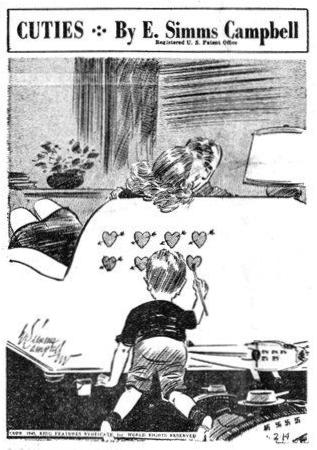
|
Determined, Gould enlisted the aid of several coolies and immediately began construction on the airstrip, and at the same time, directed the repair of the aircraft. A mixture of gas and oil was used in lieu of hydraulic brake fluid; control cables were spliced with heavy fishing twine, and twenty seven holes in the wings and fuselage were patched.
The airstrip was completed and the plane ready for take-off, two days later. But it rained heavily for two days after that, and when Sgt. Gould finally attempted to take-off three days later, the plane hit a soft spot in the field, went up on its nose, and turned completely over. Sgt. Gould was not hurt, but the plane was considerably damaged. With four more days of hard work and a new propeller, however, both the airplane and the Sgt. were ready for the second attempt.
meanwhile Gould had decided against a second try on the same field, and had been busy constructing a second airstrip several hundred yards from the old one. The new airstrip was on the other side of a large river, and it was necessary to disassemble the airplane and ferry it across on rafts, a section at a time. When this was done, the sections were carried to the new airstrip and assembled.
Gould made a successful take-off soon after the airplane was reassembled and landed safely at his home station, a few hours later.
Sgt. Gould flew in an airplane as battered as any the Fourteenth has ever seen and several hundred miles over mountainous terrain without a parachute; his safety belt was a length of rope looped under his seat and tied in his lap. Gould's explanation of his feat was typically GI.
"I got enough walking on the way in there," he said, "and riding a horse is no improvement. I was determined to fly out."
101 Officers Graduated From General Staff School In Yunnan
CHINESE TRAINING CENTER, CHINA - With many distinguished guests in attendance, 101 officers of the Chinese Army, ranging in rank from major up to and including five major generals, were graduated recently from the Chinese-American General Staff School in Yunnan Province.
Each of the officers who had completed a 10-week intensive staff course under the guidance of American officers from the U.S. Army's Command and General Staff School at Fort Leavenworth, received diplomas in Chinese and English, a class book, a class ring and a badge to be worn on their uniforms showing that they are graduates of the school.
A feature of the ceremonies was the presentation to Maj. gen. Chao Chia-Shiang, Vice-director of the school, of a bronze placque from Maj. Gen. Karl Truesdell, commandant of the Command and General Staff School at Fort Leavenworth, Maj. Gen. R. L. McClure, commanding officer of the Chinese Combat Command, represented Lt. Gen. Albert C. Wedemeyer in making the speech of presentation.
Pictures of Generalissimo Chiang Kai-shek were presented to the distinguished Chinese and American officers present.
The graduation exercises were followed by a dinner attended by the officer-graduates, the instructors, their interpreters and guests.
I Watched All things pass, even war and loneliness; Tears don't flow forever, nor rivers rise. The pain is dying as we watch - unless I tend its life with bombast and with lies. Today is tommorrow in our hearts, and ties To yesterday will melt at the touch of meeting. We won't plague this time with bitterness and sighs Nor seek to speak its end with mournful pleading. With one quick wink the season's careful seeding Flowerr, but not if we fret and watch it grow. Moments can be forever, and years fleeting - If this can be, can we not have it so? This morning I watched your tears saying goodbye, This evening I'll be home to kiss them dry. - Pfc. Ben Siegel Mail Call As I read here these many 'plaints, These sad "How come's" and moaned "Why ain't's" When some poor GI blindy gropes, For a simple answer to his mopes, I sigh and groan, "Mygawd, what dopes." - Corp. H. P. Williams My Lady Tonight, I walked with Death, and in my hand Her fingers trembled, as a lover's might When peace at last, has brought a night Of doubt to end. Beneath our feet the sand Was crunched to shapeless morass like the planned And haughty castles, which in time's swift flight, Are swept away in dust. And with the sight Of this, my Lady made me understand. We have been too long lovers, Death and I To fear this last embrace, which brings to all The peace, from which unknowing men would fly... I know my love and answer to her call... And now, my Lady, all I ask is this... Before the morning comes to know your kiss. - Lt. William B. Aycock
|
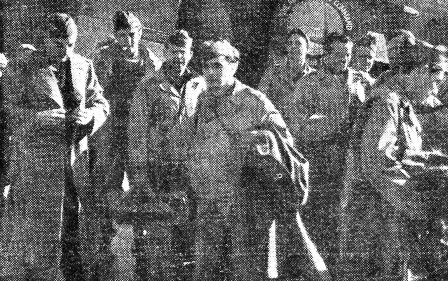 Taking a first look at China, are members of the former "Hey Rookie" traveling GI show. The group arrived at
a local airport recently, and will become members of a China Theater Band.
Taking a first look at China, are members of the former "Hey Rookie" traveling GI show. The group arrived at
a local airport recently, and will become members of a China Theater Band.
|
Something new has been added to the China Theater. It is the arrival of the members of the band of the famous "hey Rookie" GI show to swell the roster of the Theater Band, under the direction of T/Sgt. Paul Tompkins, Ann Arbor, Mich.
Hardly waiting to unpack their 'B' bags, the group immediately swung into action and in the short space of time that they had been here already have played 10 engagements varying from appearances with the Military Band to playing for dances and GI shows, and touring of the local hospital wards by small units from the band.
The band is a veteran organization. It was organized in March, 1942, at Ft. MacArthur, Cal., as the pit crew for the "Hey Rookie" show. After a nine-month run at the Belasco Theater, Los Angeles, where the show netted nearly $400,000 for service relief funds, the unit went overseas. In 20 months of overseas activity in three theaters of war the band has played for approximately 1,000 shows and entertained better than 2,000,000 Allied servicemen.
On the course of their tour through North Africa, Sicily, Italy, India and Burma, the band has played under every conceivable kinds of conditions - on shipboard, in theaters and Opera Houses, from the backs of trucks and trilers, on all kinds of improvised stages, and once played an engagement two miles behind the lines before the battle for Cassino, in Italy.
The show was broken up by the War Department last fall at the conclusion of their triumphal tour of the India-Burma theater, and now, reorganized in Kunming, China, the band will act as the foundation of the Theater Military Band, and as a unit will play for dances and give shows.
The members of the unit are Corp Raye Berger, Tampa, Florida, drums and vibraharp; Sgt. Henry Evans, Los Angeles, Cal, clarinet; Sgt. Ralph Fetheroff, Kempton, Pa., saxaphone; Corp. Arthur Flanders, Potsdam, Pa., trombone; Sgt. Wayne Harris, Alhambra, Cal., trumpet; Pvt. John R. DiJulius, East Cleveland, Ohio, accordion; S/Sgt. Lloyd Lunham, Pasadena, Cal., arranger; Sgt, Paul Neighbors, Los Angeles, Cal., drums, vocals; Corp. Irving Robins, Los Angeles, Cal., Corp. Simon Silbery, Baltimore, Md., violin, magician; Corp. John Sulin, Cleveland, Ohio, accordion; Corp. Clifford Taylor, Bellevue, Pa., saxaphone, clarinet; Pvt. Conrad P. Taylor, Burbank, Cal., trumpet, vocals; S/Sgt. Roy Wilde, Burbank, Cal., trombone and Sgt. Howard C. Williams, Salt Lake City, Utah, trumpet.
California GI Teaches Singing At China Base
AN ADVANCED CHINA AIR BASE - A Chinese-American soldier who already was helping China before he became a soldier is organizing a voice class at this forward base of the Fourteenth Air Force's Chinese-American Composite Wing.
The young virtuoso, Corp. Raymond K. Fong, Stockton, Cal., isn't even old enough to vote but he has seven years' experience as a singer to back him in his new role as a voice instructor. Lt. Alfred Grasso, base special
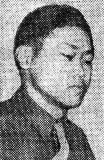
|
Corp. Fong, one of five brothers now serving in the Armed Forces, gave performances for the benefit of United China Relief before he entered the Army. He toured the San Francisco Bay area, appearing before civic groups and other organizations.
Corp. Fong, a sturdy baritone, says he began singing when he was 13. "My voice changed early and I became interested in singing," he explained. "Someday when I return to the States I hope to continue my studies and really learn something about opera."
The Californian appeared on a concert program at the San Francisco Exhibition in 1941. The next year and continuing until shortly before he was inducted, he sang for United China Relief performances. He didn't give up singing when he entered the Army, being featured on Sunday afternoon concerts at the Dayton Art Institute, Dayton, Ohio. Classified as a draftsman, he was stationed at Patterson Field, Ohio, before being sent overseas last year.
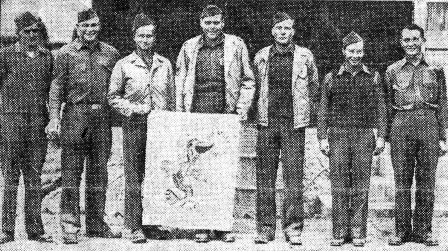
|
HOMEWARD BOUND AFTER THREE YEARS. These happy-looking individuals have good reason to be so. Overseas for three years, they have received orders sending them home on rotation. As part of the 25th Fighter Squadron, 51st Fighter Group of the Fourteenth Air Force they have seen action in the hot jungles of Assam and the cold mountains of China. Before flying the "Hump" on the first leg of their journey home, the men posed with their squadron insignia which the Japs have learned to respect and fear during the last thirty-three months of combat. Left to right: Sgt. Saul V. Amaro, Bisbee, Arizona; T/Sgt. Floyd D. Ellison, Tucson, Ariz.; M/Sgt. Phillip D. Poburka, Chicago, Ill.; M/Sgt. Ernest M. Thygeson, Great Falls, Mont.; T/Sgt. Kenneth G. Millerbergh, Salt Lak City, Utah; M/Sgt. Louis R. Leonard, Quenemo, Kan.; S/Sgt. Harry H. Moran, Oak Hill, West Va. |
GIs Disagree With Judges In Picking Beauty Contest Winner
|
Differences of opinion make horse races - and beauty contests.
That's how it happens that two girls won the honor of being acclaimed the Valentine Girl of U.S. Army forces stationed in Yunnan Province, China, in a contest sponsored by the American Red Cross.
Red Cross Director Jeff Sparks assembled an official committee of judges to pick the winning entry. Selections were made from photographs submitted by soldiers who had received them from the States or brought them with them to China. The official committeemen made their selection from the photographs entered in the contest. They picked 18 year old Miss Joan Flick, Clifton, N.J., whose picture had been entered by Corp. Joseph F. Pesko, Passaic, N.J.
Before the judges' selection had been announced, Sparks asked all the GIs assembled in the Red Cross clubrooms for the contest to turn in their selection. They picked the photograph of Mrs. Marge Engel, Baltimore, Md., whose picture was entered in the contest by her husband, Sgt. W. H. Engel.
Judges who acted on the official committee and whose faces were somewhat red when they discovered that the choice they had made did not agree with that of a majority of the GIs were Maj. Gen. G. X. Cheves, Lt. Col. George W. Hibbert, Chaplain Alvin Fine, Maj. J. J. Fettig, James Stewart of OWI and Capt. Vincent Sexton.
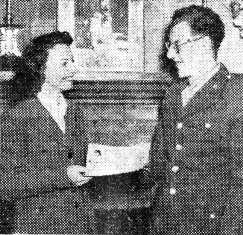 Miss Josephine Meizner, left, ARC, Peoria, Ill., presents the scroll embematic of the Grand prize in the photo contest
held at the Victory Club recently to Pfc. Teddy Glickman, Chicago, Ill.
Miss Josephine Meizner, left, ARC, Peoria, Ill., presents the scroll embematic of the Grand prize in the photo contest
held at the Victory Club recently to Pfc. Teddy Glickman, Chicago, Ill.
|
Glickman Wins Victory Club Photo Contest
Pfc. Teddy Glickman, Chicago, Ill., won the Grand Prize in the largest photography exhibition ever held in China last Sunday at a contest, at the ARC "Victory Club" sponsored by the Chinese-American Art Movement and the American Red Cross.
Although Glickman's photo won the Grand Prize awarded by the judges, Corp. Walter M. Rush, Birminham, Ala., won another Grand Prize on the basis of a popular vote. Other prizes awarded were: Portrait Division, S/Sgt. James Schnell, Hastings, N.Y.; Pictorial Division, Corp. Ben Winnert, Hollywood, Cal. and in the Human Interest section the top award went to Sgt. Meredith McCandless, Sewichley, Pa.
In view of the difficulties encountered in picture-making in China, the showing of 62 pictures was an excellent turnout. Poor water, often insufficient electric power and the difficulty of getting people to pose for shots make good pictures comparatively rare.
The rules of the contest specified that all photos be 8x10 enlargements, suitably mounted, all pictures must have been taken in China, and all pictures must have been shot, developed, enlarged and printed by the individual contestant.
Other who received "honorable mention" in the exhibition were: Sgt, Lloyd F. Carey, Los Angeles, Cal.; Sgt. B. G. Sinner, Toledo, Ohio; and Sgt. L. R. Fuller, Grand Island, Mich.

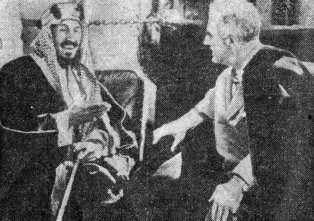 FDR MEETS KING IBN SAUD. King Ibn Saud of Saudi Arabia conversing with Pres. Roosevelt on the deck of a U.S.
warship anchored in Great Bitter Lake, near Cairo, Egypt. This was the first time that King Ibn Saud has ever left his
homeland.
FDR MEETS KING IBN SAUD. King Ibn Saud of Saudi Arabia conversing with Pres. Roosevelt on the deck of a U.S.
warship anchored in Great Bitter Lake, near Cairo, Egypt. This was the first time that King Ibn Saud has ever left his
homeland.
|
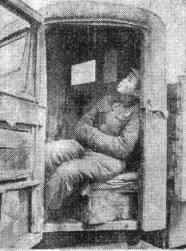 CATCHING SACK TIME. A tired Chinese driver and a tired truck at the 1340 BU, Kunming, China, were caught
by an ICD cameraman. The weary driver in true oriental fashion catches sack time sitting up in a war weary cab.
CATCHING SACK TIME. A tired Chinese driver and a tired truck at the 1340 BU, Kunming, China, were caught
by an ICD cameraman. The weary driver in true oriental fashion catches sack time sitting up in a war weary cab.
|
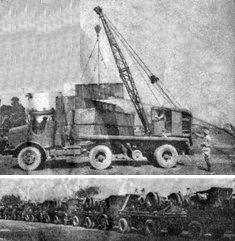 SPECIALLY DESIGNED TRACTOR-TRAILERS. One of the new tractor-trailer trucks, top, loaded with equipment
for shipment to China. Lower, extra trailer units are carried by the new five-ton International trucks, to save rail
shipping space to the roadhead. The vehicles are being assembled and outfitted by SOS troops in Calcutta.
SPECIALLY DESIGNED TRACTOR-TRAILERS. One of the new tractor-trailer trucks, top, loaded with equipment
for shipment to China. Lower, extra trailer units are carried by the new five-ton International trucks, to save rail
shipping space to the roadhead. The vehicles are being assembled and outfitted by SOS troops in Calcutta.
|
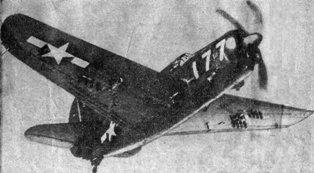 NEW U.S. NAVY HELLDIVER. First picture of the new Helldiver which participated in the first carrier-based
aircraft attack on Tokyo, Feb. 16. The plane has a 20-mm wing cannon and eight five inch rockets mounted under the
wings. Its wing bomb-racks carry a 100-pound load. The perforated flaps at the trailing edge of the wings permit
better dive breaking.
NEW U.S. NAVY HELLDIVER. First picture of the new Helldiver which participated in the first carrier-based
aircraft attack on Tokyo, Feb. 16. The plane has a 20-mm wing cannon and eight five inch rockets mounted under the
wings. Its wing bomb-racks carry a 100-pound load. The perforated flaps at the trailing edge of the wings permit
better dive breaking.
|
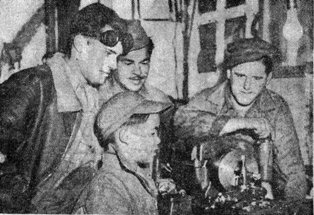 "MEATBALL" IN ACTION. More than a year ago the Chinese lad shown at the lathe at an advance China air
base, became the charge of a United States Army ordnance company when he wandered into it's machine shop at a base of
the Fourteenth Air Force's Chinese-American Composite Wing. Homeless and with a family, "Meatball" soon became the
company's favorite and now works, eats and sleeps with the American soldiers. Watching him at the lathe, left to
right are, Corp. William Howard, Mallie, Ky., Sgt. George Luchon, Mellon, Wisc., Corp Charles Mazanek, Kent, Ohio.
"MEATBALL" IN ACTION. More than a year ago the Chinese lad shown at the lathe at an advance China air
base, became the charge of a United States Army ordnance company when he wandered into it's machine shop at a base of
the Fourteenth Air Force's Chinese-American Composite Wing. Homeless and with a family, "Meatball" soon became the
company's favorite and now works, eats and sleeps with the American soldiers. Watching him at the lathe, left to
right are, Corp. William Howard, Mallie, Ky., Sgt. George Luchon, Mellon, Wisc., Corp Charles Mazanek, Kent, Ohio.
|
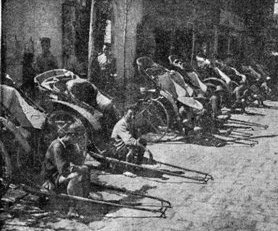 RICKSHAW STAND. Morning finds the rickshaw men with little to do. Here they are lined up in what is the
Chinese equivalent of an American taxicab stand waiting for the first customers to arrive.
RICKSHAW STAND. Morning finds the rickshaw men with little to do. Here they are lined up in what is the
Chinese equivalent of an American taxicab stand waiting for the first customers to arrive.
|
 PATIENCE. All the years of the toil and suffering in China are reflected in the patient, lined face of this
farm woman - a typical "chao mu," or grandmother - snapped at one of the 14th Air Force headquarters in China.
PATIENCE. All the years of the toil and suffering in China are reflected in the patient, lined face of this
farm woman - a typical "chao mu," or grandmother - snapped at one of the 14th Air Force headquarters in China.
|
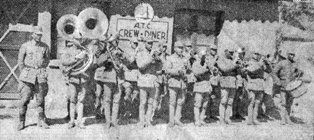 BRASS FOR THE BRASS. This Chinese band stationed at the 1340th AAF BU, China, goes into action whenever a
Chinese general steps off an ICD transport at the base.
BRASS FOR THE BRASS. This Chinese band stationed at the 1340th AAF BU, China, goes into action whenever a
Chinese general steps off an ICD transport at the base.
|
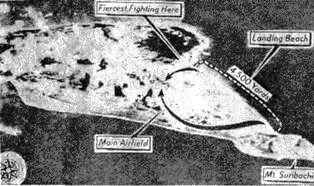 AIR VIEW OF IWO JIMA. Detailed view of Iwo in the Volcano Islands shows the beach where U.S. Marines landed
Feb. 19, later capturing the main airfield. Suribachi Field No. 1, near Mt. Suribachi, where Japanese positions were
isolated by the American drive to the northwest coast. Motoyama airfield has also been captured.
AIR VIEW OF IWO JIMA. Detailed view of Iwo in the Volcano Islands shows the beach where U.S. Marines landed
Feb. 19, later capturing the main airfield. Suribachi Field No. 1, near Mt. Suribachi, where Japanese positions were
isolated by the American drive to the northwest coast. Motoyama airfield has also been captured.
|
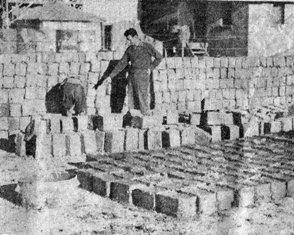 BRICKS, CHINESE STYLE. S/Sgt. Charles F. McGowan, Passaic, N.J., discovers the solution to what China does
with its good earth at the 1338 AAF BU. The Chinese mix mud with straw or reeds, fashion it into squares and stack in
long rows to dry and be used for building bricks. After three days the mud blocks become hard enough to use.
BRICKS, CHINESE STYLE. S/Sgt. Charles F. McGowan, Passaic, N.J., discovers the solution to what China does
with its good earth at the 1338 AAF BU. The Chinese mix mud with straw or reeds, fashion it into squares and stack in
long rows to dry and be used for building bricks. After three days the mud blocks become hard enough to use.
|
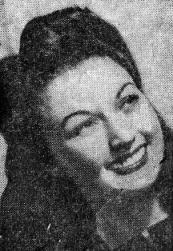 HEROES. Ginny Simms who has been giving free long distance phone calss to guests on her Stateside NBC Radio
show, now has as guests only those who wear the Purple Heart.
HEROES. Ginny Simms who has been giving free long distance phone calss to guests on her Stateside NBC Radio
show, now has as guests only those who wear the Purple Heart.
|
The CHINA COMMAND POST is the weekly newspaper of the United States Forces in the China Theater and is published by Lt. Lester H. Geiss, Editor-in-Chief, for military personnel only. T/Sgt. Harry Purcell, Managing Editor; Sgt. Maurice Pernod, Production Chief. Editorial offices: Hqrs., SOS, China Theater, Kunming, China, and Hqrs., SOS, Calcutta, India. Printed by Ajit Kumar Sinha at the "Amrita Bazar Patrika" Press, Calcutta, India.

MARCH 2, 1945
Original issue shared by Paul Shindelar
Beginning with the March 9 issue, this newspaper became The China Lantern.
Photo of the Burma Road Engineers did not appear in the original newspaper.
Copyright © 2009 Carl Warren Weidenburner
TOP OF PAGE PRINT THIS PAGE ABOUT THIS PAGE
E-MAIL YOUR COMMENTS
CLOSE THIS WINDOW
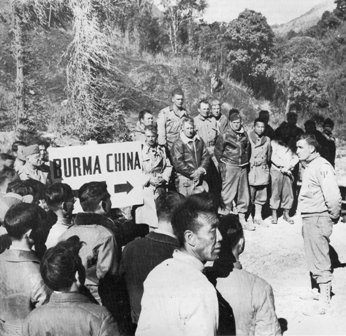 Colonel Robert F. Seedlock, right, and Burma Road Engineers at the Burma-China border on the Tengchung Cut-off.
Colonel Robert F. Seedlock, right, and Burma Road Engineers at the Burma-China border on the Tengchung Cut-off.
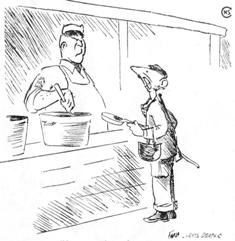
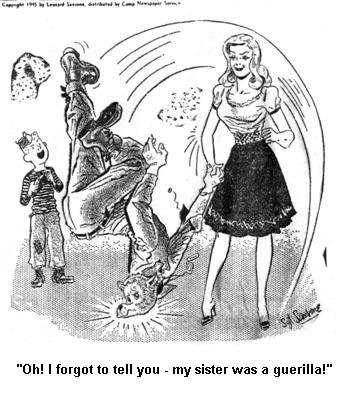
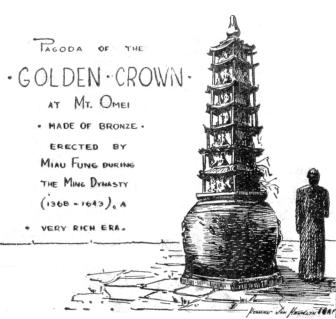
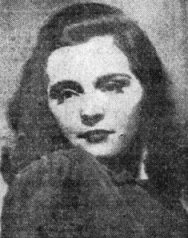 Miss Joan Flick, Clifton, N.J., was the selection of the judges for the title "Miss China Valentine of 1945."
Miss Joan Flick, Clifton, N.J., was the selection of the judges for the title "Miss China Valentine of 1945."
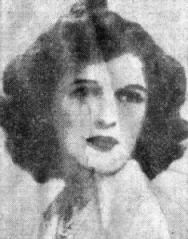 GI nomination for the title "Miss China Valentine of 1945" was Mrs. Marge Engel, Baltimore, Md.
GI nomination for the title "Miss China Valentine of 1945" was Mrs. Marge Engel, Baltimore, Md.